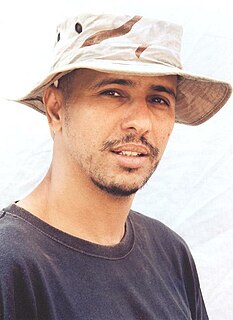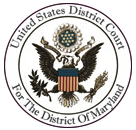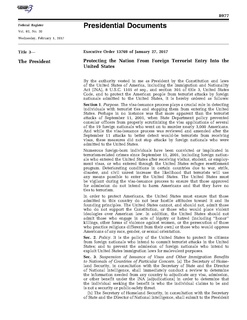Related Research Articles
American Civil Liberties Union v. Ashcroft is a lawsuit filed on behalf of a formerly unknown Internet Service Provider (ISP) owner by the American Civil Liberties Union against the U.S. federal government.
The Alien Tort Statute, also called the Alien Tort Claims Act (ATCA), is a section in the United States Code that gives federal courts jurisdiction over lawsuits filed by foreign nationals for torts committed in violation of international law. Although one of the oldest federal laws still in effect in the U.S., it was rarely used for nearly two centuries after its passage, and its exact purpose and scope remain debated. According to the U.S. Supreme Court, the Act's primary purpose was to "promote harmony in international relations by ensuring foreign plaintiffs a remedy for international-law violations in circumstances where the absence of a remedy might prove foreign nations to hold the United States accountable." Since 1980, courts have generally interpreted the ATS to allow foreign nationals to seek remedies in U.S. courts for human rights violations committed outside the United States.

Mohamedou Ould Salahi is a Mauritanian who was detained at Guantánamo Bay detention camp without charge from 2002 until his release on October 17, 2016.

Abd al-Rahim al-Nashiri is a Saudi Arabian citizen alleged to be the mastermind of the bombing of USS Cole and other maritime terrorist attacks. He is alleged to have headed al-Qaeda operations in the Persian Gulf and the Gulf states prior to his capture in November 2002 by the CIA's Special Activities Division.

Jay Scott Bybee is a Senior United States Circuit Judge of the United States Court of Appeals for the Ninth Circuit. He has published numerous articles in law journals and has taught in law school. His primary research interests are in constitutional and administrative law.
The Center for Constitutional Rights (CCR) is a progressive non-profit legal advocacy organization based in New York City, New York, in the United States. It was founded in 1966 by Arthur Kinoy, William Kunstler and others particularly to support activists in implementation of civil rights legislation and achieve social justice.

A national security letter (NSL) is an administrative subpoena issued by the United States government to gather information for national security purposes. NSLs do not require prior approval from a judge. The Stored Communications Act, Fair Credit Reporting Act, and Right to Financial Privacy Act authorize the United States government to seek such information that is "relevant" to authorized national security investigations. By law, NSLs can request only non-content information, for example, transactional records and phone numbers dialed, but never the content of telephone calls or e-mails.
Majid Shoukat Khan is a Pakistani detainee who is the only known legal resident of the United States who is held in the Guantanamo Bay detainment camps. He was detained after returning to his native Pakistan to visit his wife and was captured by Pakistani authorities, who handed him over to the CIA.
The UNROW Human Rights Impact Litigation Clinic is a student litigation and advocacy project at American University's Washington College of Law.
Shafiq Rasul, Asif Iqbal, Ruhal Ahmed, and Jamal Al-Harith, four former Guantánamo Bay detainees, filed suit in 2004 in the United States District Court in Washington, DC against former Secretary of Defense Donald Rumsfeld. They charged that illegal interrogation tactics were permitted to be used against them by Secretary Rumsfeld and the military chain of command. The plaintiffs each sought seek compensatory damages for torture and arbitrary detention while being held at Guantánamo.

Arar v. Ashcroft, 585 F.3d 559, was a lawsuit brought by Maher Arar against the United States and various U.S. officials pursuant to the Torture Victim Protection Act (TVPA), and the Fifth Amendment to the United States Constitution. The United States District Court for the Eastern District of New York dismissed Arar's complaint due to lack of personal jurisdiction and national security and foreign policy considerations. This ruling was ultimately upheld by a divided en banc panel of the United States Court of Appeals for the Second Circuit.
The Center for Justice and Accountability (CJA) is a US non-profit international human rights organization based in San Francisco, California. Founded in 1998, CJA represents survivors of torture and other grave human rights abuses in cases against individual rights violators before U.S. and Spanish courts. CJA has pioneered the use of civil litigation in the United States as a means of redress for survivors from around the world. As of 2016, it has a staff of 12 employees, headed by executive director Dixon Osburn.
Jameel Jaffer is a human rights and civil liberties attorney and the inaugural director of the Knight First Amendment Institute at Columbia University, which was created to defend the freedoms of speech and the press in the digital age.

The Torture Victim Protection Act of 1991 is a statute that allows for the filing of civil suits in the United States against individuals who, acting in an official capacity for any foreign nation, committed torture and/or extrajudicial killing. The statute requires a plaintiff to show exhaustion of local remedies in the location of the crime, to the extent that such remedies are "adequate and available." Plaintiffs may be U.S. citizens or non-U.S. citizens.
John Doe VII v. Exxon Mobil Corp (09–7125) is a lawsuit filed in the United States by 15 Indonesian villagers against Exxon Mobil Corporation from the oil-rich province of Aceh, Indonesia. The case has widespread implications for multinational corporations doing business in other countries. The case may eventually reach the Supreme Court because lower federal courts have disagreed on the liability of United States companies operating outside of the United States. Fifteen Indonesian villagers claim government security forces working for Exxon Mobil committed brutal oppression while guarding a natural gas facility in 2000 to 2001. On July 8, 2011 a divided 2-1 panel of the U.S. Court of Appeals for the District of Columbia, reversed part of a ruling by the federal district court reinstating the lawsuit. In their decision, the court stated that the 1789 Alien Tort Statute allowed corporations in foreign countries to be "held liable for the torts committed by their agents."

Patrick James Morrisey is an American politician and lawyer serving as the 34th Attorney General of West Virginia since 2013. He is a member of the Republican Party.

Cornelia Thayer Livingston Pillard, also known as Nina Pillard, is a United States Circuit Judge of the United States Court of Appeals for the District of Columbia Circuit. Before becoming a judge, Pillard was a tenured law professor at Georgetown University.

American Civil Liberties Union v. James Clapper, No. 13-3994, 959 F.Supp.2d 724 was a lawsuit by the civil liberties promoting nonprofit organization the American Civil Liberties Union (ACLU) and its affiliate, the New York Civil Liberties Union, against the United States federal government that challenged the legality of the National Security Agency (NSA)'s bulk phone metadata collection program. On December 27, 2013, the court dismissed the case, finding that metadata collection did not violate the Fourth Amendment. On January 2, 2014, the ACLU appealed the ruling to the United States Court of Appeals for the Second Circuit. On May 7, 2015, the appeals court ruled that Section 215 of the Patriot Act did not authorize the bulk collection of metadata, which judge Gerard E. Lynch called a "staggering" amount of information.

Wikimedia Foundation, et al. v. National Security Agency, et al. is a lawsuit filed by the American Civil Liberties Union (ACLU) on behalf of the Wikimedia Foundation and several other organizations against the National Security Agency (NSA), the United States Department of Justice (DOJ), and other named individuals, alleging mass surveillance of Wikipedia users carried out by the NSA. The suit claims the surveillance system, which NSA calls "Upstream", breaches the First Amendment to the United States Constitution, which protects freedom of speech, and the Fourth Amendment to the United States Constitution, which prohibits unreasonable searches and seizures.

Executive Order 13769 was signed by U.S. President Donald J. Trump on January 27, 2017, and quickly became the subject of legal challenges in the federal courts of the United States. The order sought to restrict travel from seven countries: Iran, Iraq, Libya, Somalia, Sudan, Syria, and Yemen. The plaintiffs challenging the order argued that it contravened the United States Constitution, federal statutes, or both. On March 16, 2017, Executive Order 13769 was superseded by Executive Order 13780, which took legal objections into account and removed Iraq from affected countries. Then on September 24, 2017 Executive Order 13780 was superseded by Presidential Proclamation 9645 which is aimed at more permanently establishing travel restrictions on those countries except Sudan, while adding North Korea and Venezuela which had not previously been included.
References
- 1 2 3 "Meshal v. Higgenbotham". American Civil Liberties Union.
- ↑ "Meshal v. Higgenbotham complaint" (PDF).
- 1 2 3 United States Court of Appeals for the District of Columbia Circuit AMIR MESHAL, APPELLANT v. CHRIS HIGGENBOTHAM, FBI SUPERVISING SPECIAL AGENT, IN HIS INDIVIDUAL CAPACITY, ET AL., APPELLEES Argued May 1, 2015 Decided October 23, 2015 No. 14-5194 (accessed 3 Nov. 2015)
- ↑ Sam Hananel (2015-10-23). "Appeals court says American can't sue FBI over abuse claims". Boston Globe . Washington DC. Archived from the original on 2015-10-25. Retrieved 2020-05-26.
The lawsuit, which the American Civil Liberties Union filed on Meshal’s behalf, says US officials sent him back to Somalia and eventually to Ethiopia, where he was imprisoned in secret for several months. He says FBI agents accused him of receiving training from Al Qaeda and subjected him to harsh interrogations while denying him access to a lawyer, his family, or anyone else. He was released in May 2007 with no explanation, according to the lawsuit.
- ↑ Patrick G. Eddington (2015-11-03). "How the F.B.I. Can Detain, Render and Threaten Without Risk". The New York Times . p. A31. Archived from the original on 2019-02-20. Retrieved 2020-05-26.
Eight years after Mr. Meshal’s rendition, his case ended up before a three-judge panel of the United States Court of Appeals for the District of Columbia.